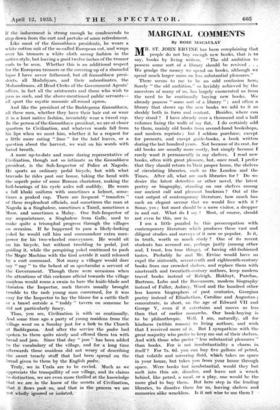MARGINAL COMMENTS
By ROSE MACAULAY
MR. ST. JOHN ERVINE has been complaining that people do not buy enough new books, that is to say, books by living writers. " The old ambition to possess some sort of a library should be revived . . . We grudge the money we spend on books, although we spend much larger sums on less substantial pleasures."
There seems to me to be an odd confusion here. Surely " the old ambition," so lavishly achieved by the ancestors of many of us, has largely exonerated us from the need to be continually buying new books. We already possess " some sort of a library " ; and often a library that shows up the new books we add to it as shoddy both in form and content. Besides, where can they stand ? I have already over a thousand and a half volumes lining the walls of my flat. I do certainly add to them, mainly old books from second-hand bookshops, and modern reprints ; but I seldom purchase, except for presents, and except guide-books, a book written during the last hundred years. Not because of its cost, for old books are usually more costly, but simply because I rarely want it permanently in my shelves. I read new books, often with great pleasure, but, once read, I prefer that they should return to Their proper home, the shelves of. circulating libraries, such as the London and the Times. After all, what are such libraries for ? Do we desire the latest detective or other novel, the latest poetry or biography, standing on our shelves among our ancient calf and pleasant buckram ? Out of the vast output of contemporary literature, how much has such an elegant savour that we would live with it ? Some, yes ; but most should be a mere visitor, a dropper in and out. What do I say ? Most, of course, should not even be this, nor is.
I am a little puzzled by this preoccupation with contemporary literature which produces these vast and diligent studies and surveys of it now so popular. Is it, in truth, worth so much study ? One of its recent students has accused me, perhaps justly (among other and, I trust, less true things), of having old-fashioned tastes. Probably he and Mr. Ervin would have us expel the sixteenth, seventeenth and eighteenth-century books from our crowded shelves, and replace them with nineteenth and twentieth-century authors, keep modern travel books instead of Raleigh, Hakluyt, Purchas, Bertram, Lobo and the Buccaneers, modern biography instead of Fuller, Aubrey, Wood and the hundred other less known biographers of past centuries, Georgian poetry instead of Elizabethan, Caroline and Augustan ; concentrate, in short, on the age of Edward VII and George V, even if it entertains and moves us less than that of earlier monarchs. Our book-buying is to be philanthropic. Well, I am, naturally, all for kindness (within reason) to living authors, and wish that I received more of it. But I sympathize with the great majority who prefer to keep me out of their shelves. And with those who prefer " less substantial pleasures " than books. For is not insubstantiality a charm in itself ? For 7s. 6d. you can buy five gallons of petrol, that volatile and sorcering fluid, which takes no space in your house, but takes you from your house through space. Were books but insubstantial, would they but melt _into thin air, dissolve, and leave not a wrack behind, like petrol, a meal, or a play, one would be the more glad to buy them. But here step in the lending libraries, to dissolve them for us, leaving shelves and memories alike wrackless. Is it not wise to use them ? •


















































 Previous page
Previous page